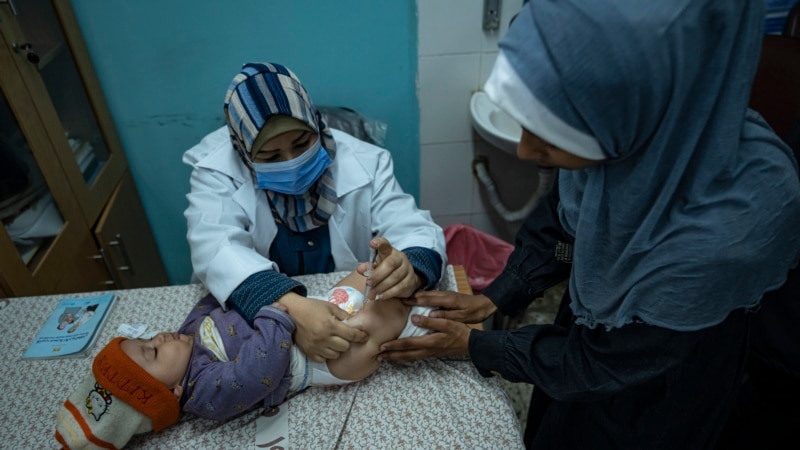Polio at high risk of spreading within Gaza Strip

Geneva — A senior World Health Organization official expressed alarm Tuesday at the high risk of polio spreading within the Gaza Strip because of dire sanitary conditions in the war-wracked enclave, and that the paralytic disease it causes could spill across borders without prompt action to stem the outbreak.
“I am, like, super worried,” Dr. Avadil Saparbekov, team lead for health emergencies at the WHO in the occupied Palestinian territory, told journalists from Jerusalem. “I am extremely worried about an outbreak happening in Gaza … and that it may spill over internationally at a very high point.”
Saparbekov, who recently returned from a weeklong visit to Gaza, confirmed that "circulating vaccine-derived poliovirus type 2" has been identified in samples of Gazan sewage assessed by researchers and that an epidemiological probe “to identify the potential source of this importation” is underway.
“Based on the results of the assessment, WHO and the GPEI (Global Polio Eradication Initiative) partners will consolidate a set of recommendations, including the need for a mass vaccination campaign,” he said.
On July 16, the Global Polio Laboratory Network isolated the virus in six environmental surveillance samples collected from sewage on June 23 in Khan Younis and Deir al Balah in Gaza.
The WHO reports that further genomic sequencing of the samples by the U.S. Centers for Disease Control and Prevention indicates that they are related to environmental samples that were circulating in Egypt during the second half of last year.
“It is important to note that poliovirus has been isolated from environmental samples only at this time; no associated paralytic cases have been detected,” Saparbekov stressed.
Circulating vaccine-derived poliovirus is transmitted from person to person mainly through the fecal-oral route. It can invade a person’s nervous system and cause paralysis and death.
“We have not yet collected the human samples to identify any viruses because of the lack of equipment to collect those and lack of capacity to test those samples,” Saparbekov said, noting that WHO and UNICEF teams entering Gaza on Thursday will bring up to 50 sample collection kits “so we will be able to collect human samples, stool samples from humans.”
The samples, he said, will be sent to a lab in Jordan to confirm any cases of infection.
“Until that is done, I cannot say that there are any humans that are affected with this circulating vaccine-derived poliovirus,” he said.
The WHO said that wild poliovirus was eliminated more than 25 years ago in the Palestinian territories. Before the start of the war in Gaza, following a vicious attack on Israel by Hamas militants on October 7, the U.N. health agency says 89% of the population was vaccinated against polio, primarily conducted through routine immunization.
Last Sunday, Israel’s military said it would offer polio vaccinations to soldiers serving in Gaza to protect against the paralytic disease.
Saparbekov said the WHO will be reaching out to COGAT, the Israeli authority responsible for the coordination of government activities in the Palestinian territories, “to see how they can facilitate” the response to the outbreak. One way to do that, he added, is to have vaccines available for Gazans in case “there is a decision to conduct a mass campaign.”
“We have so far received assurances that this will be done,” he said.
The WHO official expressed hope that the epidemiological investigation and risk assessment would be completed by the end of the week, such that his team “will have a joint recommendation from the GPEI network about what to do with this particular outbreak” by Sunday.
In the meantime, he said, aid workers are doing their best to inform the population as to health measures they must take to prevent a polio outbreak.
“Given the water and sanitation limitations in Gaza, it will be very difficult for the population to follow the advice to wash their hands, to drink safe water,” he said.
“Unfortunately, the majority that live in shelters with one toilet for 600 people and maybe 1.5 liters of water per person, will definitely not be able to follow the recommendations that we are providing,” he said.
While reiterating concerns about polio spreading in the Palestinian enclave, WHO health emergency chief Saparbekov said he also is very worried about the possible outbreak of other communicable diseases.
“We had Hepatitis A confirmed last year and now we may have a polio outbreak,” he said. “So, with the crippled health system, lack of water and sanitation, as well as lack of access of the population to health services, specifically primary health services, this is going to be a very bad situation that will happen in Gaza.
“We may have more people dying from communicable diseases than from injuries and related conditions,” he warned.
